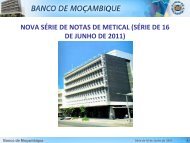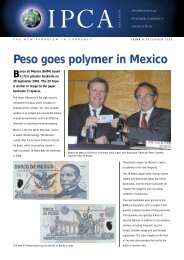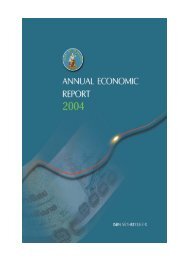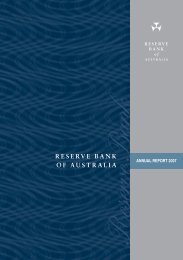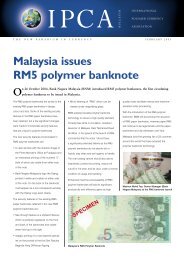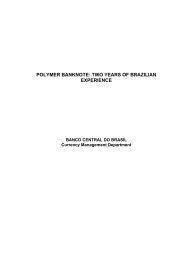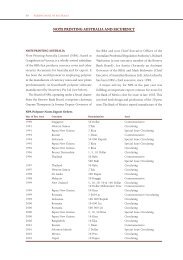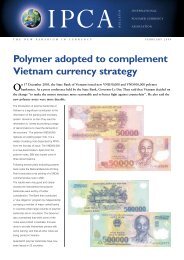ANNUAL REPORT 2008 - Polymer Bank Notes of the World
ANNUAL REPORT 2008 - Polymer Bank Notes of the World
ANNUAL REPORT 2008 - Polymer Bank Notes of the World
You also want an ePaper? Increase the reach of your titles
YUMPU automatically turns print PDFs into web optimized ePapers that Google loves.
Slovakia into <strong>the</strong> euro area on 1 January 2009.It found <strong>the</strong> SSS to be compliant with <strong>the</strong> userstandards and thus eligible for use in Eurosystemmonetary policy and intraday credit operations.In addition, <strong>the</strong> Eurosystem also undertook itsfirst comprehensive assessment <strong>of</strong> all SSSs,links and relayed links already in use, <strong>the</strong> results<strong>of</strong> which are expected to become available inspring 2009.In <strong>2008</strong> <strong>the</strong> Eurosystem assessed a new holdingarrangement for international debt securitiesin global registered form issued jointly by <strong>the</strong>two international central securities depositories(ICSDs), Euroclear <strong>Bank</strong> (Belgium) andClearstream <strong>Bank</strong>ing Luxembourg. This newarrangement – to be introduced by mid-2010 –will replicate <strong>the</strong> main principles <strong>of</strong> <strong>the</strong> NewGlobal Note arrangement introduced in 2006for international debt securities in global bearerform. In view <strong>of</strong> <strong>the</strong> decreasing issuance <strong>of</strong>international debt securities in individual noteform, a revision <strong>of</strong> <strong>the</strong>ir holding structure was notjustified. It was <strong>the</strong>refore decided to withdraw<strong>the</strong>se securities from <strong>the</strong> list <strong>of</strong> eligible assetsfor Eurosystem credit operations. A transitionalperiod ending on 30 September 2010 has beendefined, in which securities <strong>of</strong> this type issuedbefore or on that date will continue to be eligiblefor use as collateral until <strong>the</strong>ir maturity.ESCB-CESR RECOMMENDATIONS FOR SECURITIESCLEARING AND SETTLEMENT IN THE EUROPEANUNIONIn 2001 <strong>the</strong> Governing Council approved aframework for cooperation between <strong>the</strong> ESCBand CESR on issues related to securitiesclearing and settlement systems. A jointworking group was created in <strong>the</strong> same year toadapt <strong>the</strong> recommendations for SSSs drawn upby <strong>the</strong> CPSS and <strong>the</strong> International Organization<strong>of</strong> Securities Commissions (<strong>the</strong> CPSS-IOSCOrecommendations) to <strong>the</strong> EU landscape, andfrom 2004 also <strong>the</strong> recommendations for centralcounterparties. The work was frozen in 2005owing to three open issues regarding <strong>the</strong> scope,content and legal basis <strong>of</strong> <strong>the</strong> ESCB-CESRrecommendations.On 3 June <strong>2008</strong> <strong>the</strong> ECOFIN Council formallyinvited <strong>the</strong> ESCB and CESR to adapt and finalise<strong>the</strong>ir draft “Standards for securities clearingand settlement in <strong>the</strong> EU” by autumn <strong>2008</strong>,respecting a number <strong>of</strong> principles, namelythat: i) <strong>the</strong> adopted text should take <strong>the</strong> form <strong>of</strong>non-binding recommendations addressed solelyto public authorities and not to market participants,ii) its scope should include ICSDs and excludecustodian banks, and iii) on credit and liquidityrisk controls, <strong>the</strong> benchmark accepted by <strong>the</strong>G10 – namely CPSS-IOSCO Recommendation 9for SSSs – should be adopted.In accordance with <strong>the</strong> ECOFIN Council’srequest, <strong>the</strong> ESCB-CESR working groupresumed its work and prepared a set <strong>of</strong> draftrecommendations which were subject to apublic consultation from 23 October <strong>2008</strong>until 23 January 2009. During <strong>the</strong> consultationperiod, a public hearing for interested partieswas held.The European Parliament, <strong>the</strong> EuropeanCommission, CEBS, market participants andassociations were closely involved in thiswork at various stages. The final approval <strong>of</strong><strong>the</strong> revised recommendations by CESR, <strong>the</strong>Governing Council and <strong>the</strong> non-euro area NCBsis expected to take place at <strong>the</strong> end <strong>of</strong> <strong>the</strong> firstquarter <strong>of</strong> 2009. In parallel, CEBS is carryingout an analysis to identify areas where fur<strong>the</strong>rmeasures may be needed to bridge <strong>the</strong> gapbetween <strong>the</strong> ESCB-CESR recommendationsand <strong>the</strong> banking regulation applicable to bankswhich have internalised clearing and settlementactivities.The recommendations, once finalised, will be usedby central bank overseers and securities regulatorswith a view to safeguarding both <strong>the</strong> soundnessand efficiency <strong>of</strong> securities clearing and settlementin <strong>the</strong> EU as well as ensuring a level playing-fieldfor <strong>the</strong> various infrastructures. The ESCB-CESRrecommendations complement <strong>the</strong> work <strong>of</strong> o<strong>the</strong>rEU fora and are regarded as one <strong>of</strong> <strong>the</strong> pillars <strong>of</strong><strong>the</strong> EU policy on <strong>the</strong> post-trading sector, toge<strong>the</strong>rwith TARGET2-Securities, <strong>the</strong> Code <strong>of</strong> ConductECBAnnual Report<strong>2008</strong>167



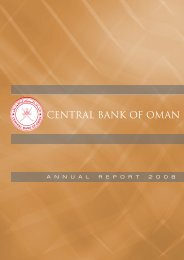
![KNOW YOUR NEW GIBRALTAR BANKNOTES - [Home] bThe/b](https://img.yumpu.com/50890985/1/184x260/know-your-new-gibraltar-banknotes-home-bthe-b.jpg?quality=85)
![PAPUA NEW GUINEA - [Home] - Polymer Bank Notes of the World](https://img.yumpu.com/49758743/1/190x143/papua-new-guinea-home-polymer-bank-notes-of-the-world.jpg?quality=85)

